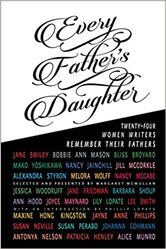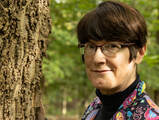I got Every Father’s Daughter from the library to read the essay by Jane Friedman, whose blog and online classes have been invaluable to me. Because I’m me, I started reading from the beginning.
| In the foreword, Margaret McMullan tells the story of her own father and her quest for “a collection of intensely personal essays, written by great women writers telling me about their fathers and how they came to know their fathers” after her father’s death. Some of the essays fulfill that mandate, but others were pulled from longer memoirs or novels. I got the impression those were included because the authors were “names” in the literary world. Two of the writers described their famous author fathers, one of whom wrote the introduction to the book, which gave the collection a cliquish feel--although the stronger essays made the book worth reading. |
Barbara Shoup noted: “Life, like a good story, sets its own course. In time the ‘what ifs’ of your childhood fall away, the bits and pieces that brought you to the beginning of your adult life, combust, and begin moving you toward an ending you can’t imagine, but becomes clearer, inevitable, the farther you go.”
Johanna Gohmann, whose father developed Alzheimer’s said: “Losing someone this way--this subtle losing, piece by piece--is its own unique kind of sadness.” And: “His life stretches behind him full of heartbreaks and triumphs and mysteries that I will never really grasp. And through him I learn that understanding people and loving them sometimes have very little to do with one another.”
Lily Lopate attributed this to her writer father: “If you’re willing to roll up your sleeves and put in the time you can make words do anything you want them to.” He urged her to “write honestly, lean towards discomfort, attempt to delve into unresolved tangled territory and engage with humor.”
Jane Friedman’s father, “taught me to be true to myself, and to live life on my own terms . ..
Johanna Gohmann, whose father developed Alzheimer’s said: “Losing someone this way--this subtle losing, piece by piece--is its own unique kind of sadness.” And: “His life stretches behind him full of heartbreaks and triumphs and mysteries that I will never really grasp. And through him I learn that understanding people and loving them sometimes have very little to do with one another.”
Lily Lopate attributed this to her writer father: “If you’re willing to roll up your sleeves and put in the time you can make words do anything you want them to.” He urged her to “write honestly, lean towards discomfort, attempt to delve into unresolved tangled territory and engage with humor.”
Jane Friedman’s father, “taught me to be true to myself, and to live life on my own terms . ..
My father died in December, 2015. I thought I’d thoroughly processed my tangled grief. I was surprised when I was up all night after reading the first few essays in this book, transcribing a poem about my relationship with my dad that took hold of me and didn't let go until I’d wrestled the whole thing into the writing notebook at my bedside.
This book was personally valuable to me (for the poem born of reading it, currently out on submission), but isn’t the book it could have been, due to the uneven tone and insular quality of the selections. I found many of the personal essays poignant; the other selections were less resonant for me.


 RSS Feed
RSS Feed